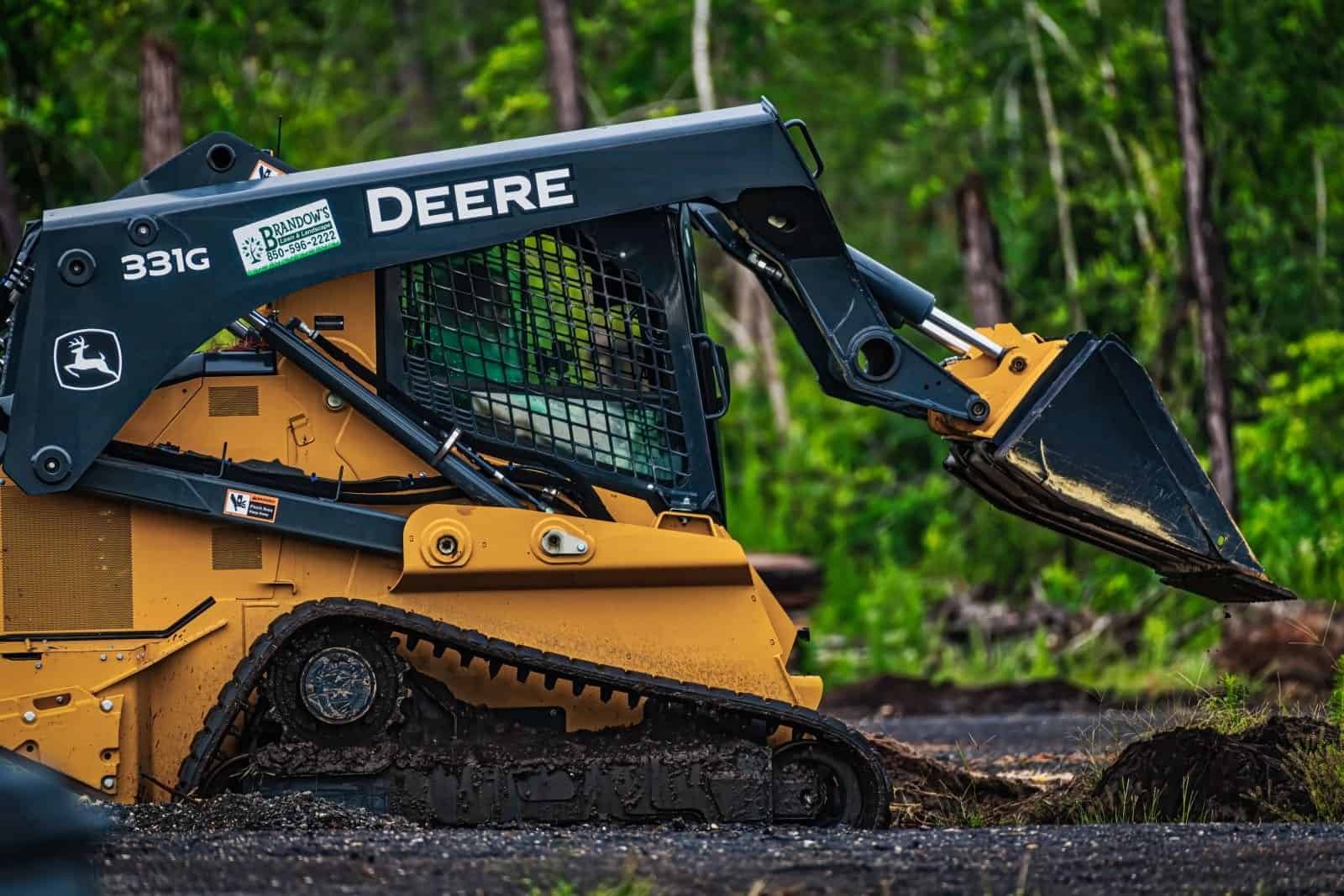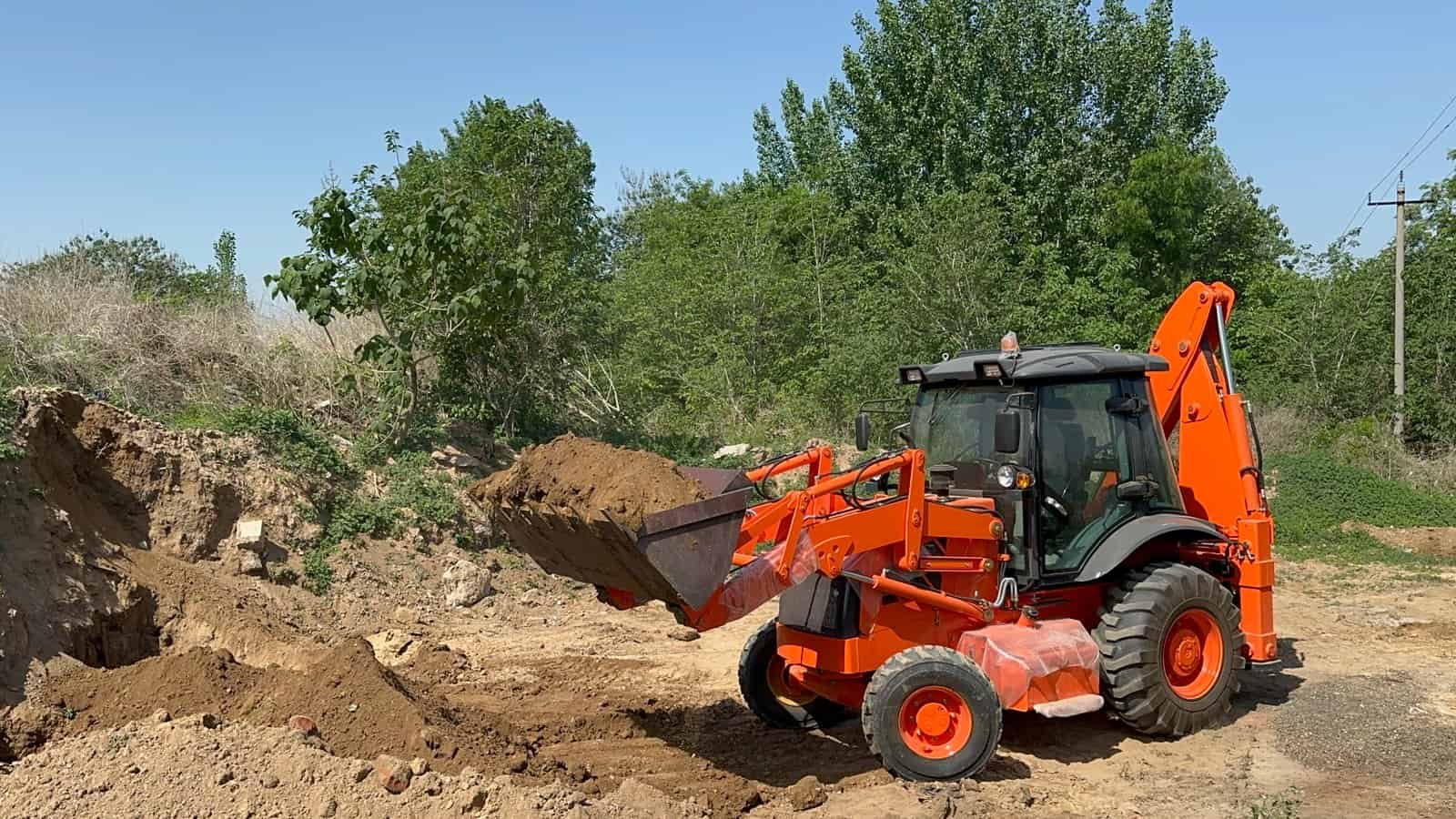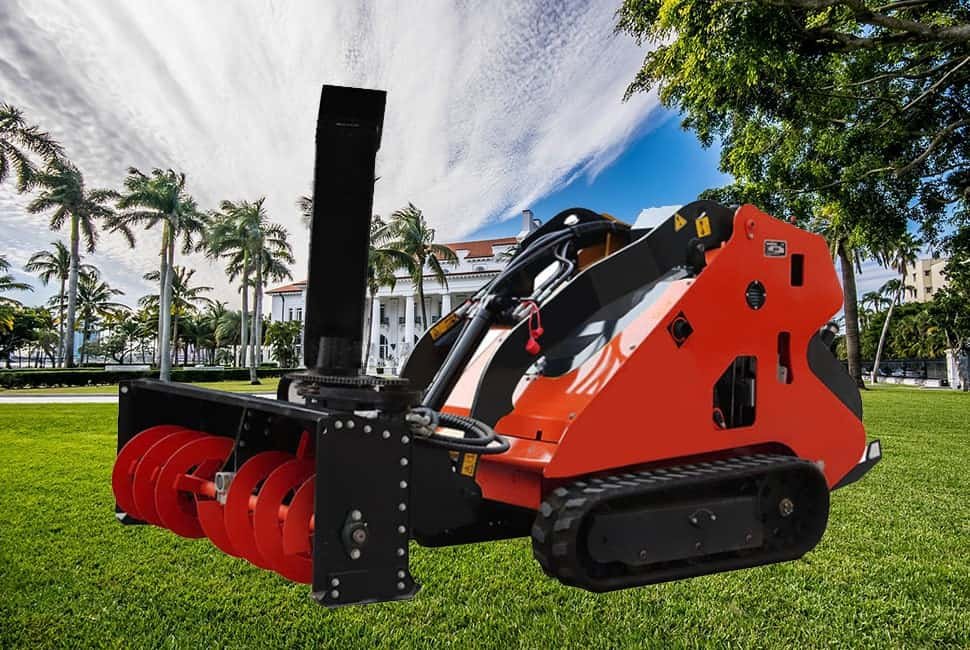Choosing between a skid steer vs backhoe can be challenging. We will explore key differences, helping you make an informed decision for your next project.
A skid steer and a backhoe are both versatile machines but serve different purposes. Skid steers are great for maneuverability and smaller jobs, while backhoes offer greater digging depth and power for larger tasks. This guide will help you understand which machine suits your project needs best.
Now, let’s explore the key differences between these two machines to determine which is the best fit for your work.
Qu'est-ce qu'une chargeuse compacte ?
Skid steers are the go-to compact and nimble workhorses that are widely recognized for their versatility in construction, agricultural, and landscaping sectors. Despite their compact stature, these machines boast powerful engines that empower them to tackle challenging tasks with ease, even in the most confined of spaces.
A skid steer loader stands out as the perfect solution for tasks that demand exceptional maneuverability within tight quarters. Whether the job at hand involves digging, lifting, or loading, these loaders shine with their ability to navigate through spaces where larger machinery would simply be too cumbersome. Their adaptability has solidified their reputation as a favorite for smaller-scale projects and in settings where space is at a premium.

What sets skid steers apart is their distinctive wheel system, which allows them to pivot effortlessly without the need for a conventional steering mechanism. This feature significantly enhances their maneuverability, enabling operators to execute tasks in narrow or densely packed areas that would be a challenge for larger machines. The adaptability of skid steers is further amplified by their compatibility with a range of attachments, including buckets, forks, and augers, transforming them into a multifaceted tool suitable for an array of projects. While skid steers are masters of their domain in smaller-scale operations, they might not possess the sheer muscle required for extensive excavation or heavy-duty lifting tasks that demand more robust machinery.
Qu’est-ce qu’une pelle rétrocaveuse ?
A backhoe is a formidable piece of heavy machinery, distinguished by its front-mounted bucket and a rear-mounted backhoe attachment, both designed for powerful digging and lifting operations. This multifaceted machine is a staple in the world of heavy-duty excavation, trenching, and lifting tasks, where its size and strength truly shine.
The backhoe outperforms the skid steer in terms of robustness, offering a greater digging depth and an elevated lifting capacity. These attributes make it the go-to choice for large-scale construction endeavors, extensive road projects, and ambitious landscaping tasks that demand the power and reach of a true workhorse.

Renowned for its formidable digging prowess, the backhoe is perfectly suited for tasks that necessitate substantial excavation depths, such as trenching for the installation of pipelines or utility lines. Its versatility is further enhanced by its dual functionality, which enables it to adeptly handle both digging and loading operations. However, its larger stature and less agile maneuverability may restrict its effectiveness in tight spaces, an area where the compact skid steer excels. The backhoe’s digging arm, significantly longer than that of a skid steer, positions it as the ideal choice for deep trenching and heavy lifting, yet it may not be the best fit for areas with spatial constraints.
Key Differences Between Skid Steer vs Backhoe
While both the skid steer and the backhoe are stalwarts in the construction industry, they each bring distinct functionalities, capabilities, and ideal applications to the table. Let’s delve into the key distinctions that set these two machines apart.
| Feature | Pelle rétro | Skid Steer |
|---|---|---|
| Primary Function | Digging, trenching, and loading | Lifting, pushing, and carrying materials |
| Conception | Excavator arm on one end, loader bucket on the other | Front-facing bucket, compact design |
| Maniabilité | Moderate, can pivot but requires more space | High, can pivot in tight spaces |
| Terrain Suitability | Good on varied terrain, but best on firm ground | Best on firm, level ground |
| Attachements | Buckets, hammers, augers, trenchers | Buckets, augers, trenchers, forks, sweepers, etc. |
| Plage de poids | 12,000 – 25,000 lbs | 1,500 – 12,000 lbs |
| Operating Capacity | 1,500 – 3,500 lbs (loader end) | 700 – 3,000 lbs |
| Digging Depth | Up to 15 – 18 feet | Limited, typically shallow |
| Lift Height | 10 – 14 feet (loader end) | 8 – 12 feet |
| Lift Weight | 1,500 – 3,500 lbs (loader end) | 700 – 3,000 lbs |
| Stability | More stable due to larger size and weight | Less stable on uneven ground |
| Vitesse | Moderate, can drive on roads | Faster, better for moving around job sites |
| Cost | $50,000 – $120,000+ (new) | $20,000 – $60,000+ (new) |
| Entretien | More complex and costly | Easier and less costly |
| Efficacité énergétique | Moderate | Less fuel-efficient |
| Versatilité | Highly versatile for both digging and loading | Highly versatile with various attachments |
| Common Industries | Construction, agriculture, utilities | Construction, landscaping, agriculture |
| Operator Skill | Requires more skill and training | Easier to learn |
| Popular Brands/Models | CAT 420F2, John Deere 310L, JCB 3CX | Bobcat S650, CAT 262D, John Deere 318G |
The primary distinctions between skid steer vs backhoe lie in their size, power, agility, and the range of tasks they are best suited for. Skid steers are champions in tight quarters, whereas backhoes shine in larger, more demanding scenarios that necessitate substantial digging depth.
Maneuverability: Skid steers boast exceptional agility in confined spaces, positioning them as the top choice for tasks in congested or cramped settings. Their innovative skid-steer mechanism enables them to pivot on the spot, rendering them highly effective for tasks such as loading, unloading, and grading. Conversely, backhoes, with their more substantial build, require ample space to maneuver and are more adept at open-site operations where spatial constraints are not an issue.
Digging Depth & Power: Backhoes generally offer a deeper digging capacity compared to skid steers, enabling them to undertake heavy-duty excavation tasks. This makes backhoes particularly well-suited for large-scale construction projects that involve significant digging, such as laying foundations or trenching for utilities. The backhoe’s robust engine and extended arm length provide greater reach and power, giving it a distinct advantage over the skid steer when it comes to tackling more challenging and deeper digging assignments.
Attachments & Versatility: Skid steers stand out for their adaptability, thanks to the wide array of attachments available for a diverse range of tasks, including snow plowing, grading, or lifting. While backhoes are indeed versatile in their ability to perform multiple tasks with their front bucket and backhoe arm, their capacity to swiftly interchange attachments is more limited compared to skid steers. This makes the skid steer the more versatile option overall, capable of thriving in a broader spectrum of work environments.
Which Machine Is Better for Your Project?
The decision to opt for a skid steer vs backhoe hinges significantly on the unique demands of your project. Let’s explore which of these machines is best suited for various types of undertakings.
If you’re in search of a machine that is both agile and versatile for smaller-scale endeavors, the skid steer stands out as the optimal choice. Conversely, for larger construction projects that demand formidable digging capabilities, the backhoe emerges as the more fitting alternative.
In the realm of landscaping, minor construction initiatives, or operations within cramped quarters, a skid steer offers the flexibility and efficiency essential for success. Its ability to accommodate a wide range of attachments positions it as an ideal candidate for an assortment of tasks, including grading, digging, and lifting. In contrast, when confronted with extensive excavation projects, such as the excavation of deep trenches or heavy-duty earthmoving, the backhoe takes the lead thanks to its expansive digging arm, robust bucket, and superior lifting capabilities. For road construction, heavy-duty construction, and utility installation, the backhoe is often the preferred machine of choice.
Pros and Cons of Skid Steers and Backhoes
Understanding the capabilities and constraints of each piece of machinery is crucial for selecting the right tool for the job. Below is a detailed comparison of the advantages and disadvantages of skid steer vs backhoe to assist you in determining which one aligns with your specific requirements.
Skid Steers:
Avantages :
- Their compact design makes them ideal for navigating tight spaces where larger machinery would struggle.
- Their versatility is unmatched, thanks to the wide array of attachments available for various tasks.
- They are perfect for landscaping and smaller-scale construction jobs that require agility and adaptability.
Inconvénients :
- They may not possess the raw power needed for heavy-duty tasks that demand more robust machinery.
- Their digging depth is not as extensive as that of backhoes, which can be a limiting factor for certain projects.
Backhoes:
Avantages :
- They boast impressive digging and lifting capabilities, making them a powerhouse for heavy excavation work.
- They are well-suited for large-scale construction projects that require significant digging depth and lifting capacity.
- Their robust design allows them to handle the demands of heavy earthmoving and utility installation tasks.
Inconvénients :
- Their larger size can be a disadvantage in confined spaces where maneuverability is key.
- They are less agile than skid steers, which can slow down operations in environments with limited space.
When pondering the choice between a skid steer and a backhoe, take into account the scale and setting of the job at hand. Skid steers are the superior choice for agile, smaller-scale projects that involve frequent movement and adaptability. Backhoes, with their strength and reach, excel in heavier, more intensive tasks that necessitate substantial digging depth and lifting capacity.
Résumé
In conclusion, choosing between a skid steer and a backhoe depends on your project’s size and complexity. Evaluate your needs for maneuverability, power, and digging depth before making a decision.

